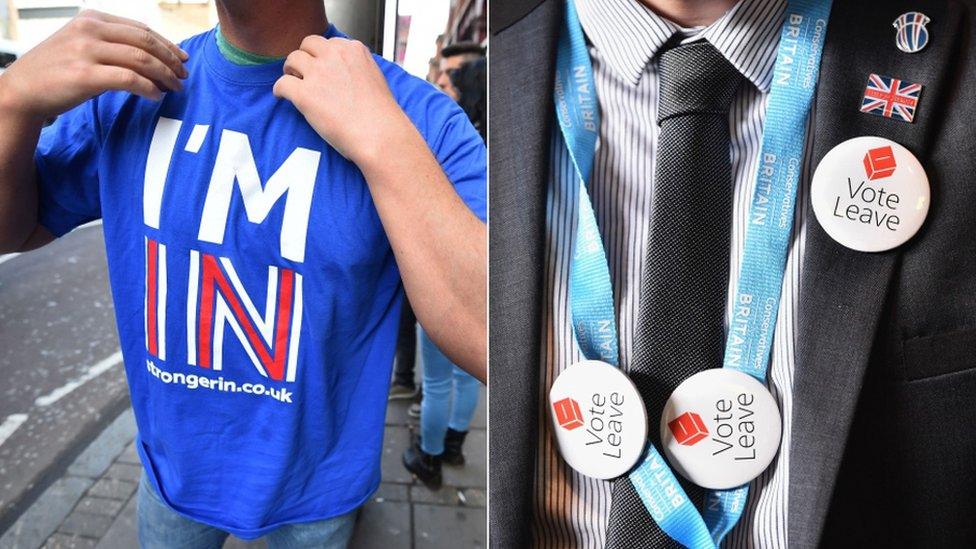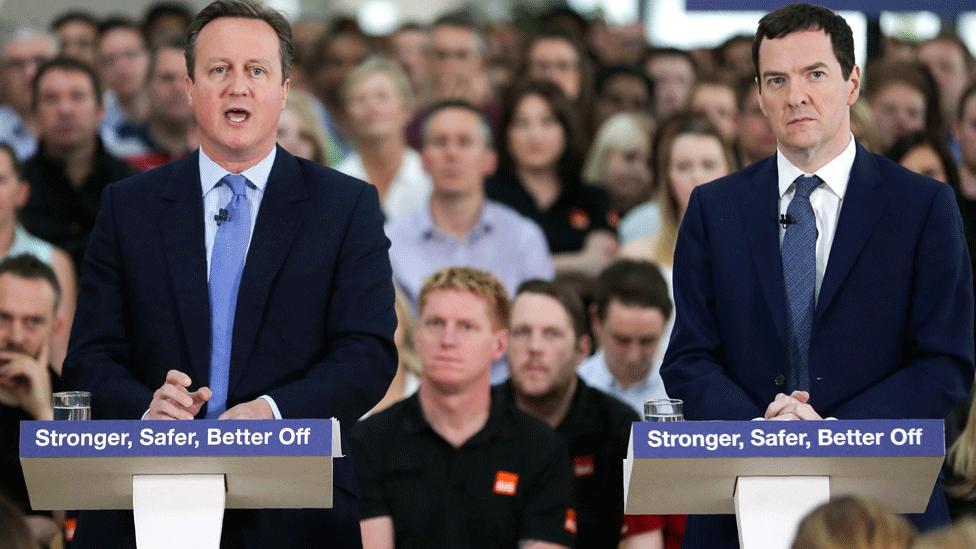Do Scots really feel more positive about the EU?
- Published

Two campaigns, vote Leave and vote Remain have just under a month to win over voters
Opinion polls consistently suggest that Scottish voters seem more inclined to back remaining in the EU than people elsewhere in Britain.
An average across recent polls, external indicates about two thirds of Scots are planning to vote to stay in the EU. But the polls don't tell us why voters in Scotland seem to feel more positively toward the European Union.
There is no single, simple answer to that question.
Lower levels of immigration in Scotland undoubtedly helps - alongside the economic benefits for thriving export industries like fine foods and whisky.
Although the fishing community in the North East of Scotland argue passionately that it is in their interests to leave.
It is also very noticeable that there are no well known senior politicians in Scotland campaigning for a vote to leave.
All the five party leaders in Holyrood want to stay in and only a few Tory MSPs, plus one Labour MSP, who disagree.
UKIP have never made much of an impact on Scottish politics and don't have a loud voice in this debate.
The SNP, which enjoys such buoyant support in Scotland these days, firmly wants to stay in. Only their former deputy leader Jim Sillars makes a nationalist case for leaving - and he is very much a lone voice.
What of identity?
For many Scots the real question is why are we having this referendum at all? Viewed from north of the border it looks like a civil war inside the (English) Tory party that's now being played out across the whole of the UK.
For decades Eurosceptism has looked like an almost exclusively right wing pursuit and that makes many Scots want to deliberately vote the other way.
But that position is slightly confused by the fact that the Prime Minister and the Chancellor are campaigning to remain.
Lots of left wing voters have told me they feel deeply uncomfortable voting the same way as Cameron and Osborne.

David Cameron and George Osborne are on the same side when it comes to EU membership
And it's obvious Scotland's First Minister Nicola Sturgeon is not keen to give full throated support for the cause supported by most of the Tory cabinet. She says she very much wants to see a vote to remain but doesn't hesitate to criticise the PM's campaigning tactics.
As I have travel around Scotland asking voters how they feel and why - many have made eloquent points about how views of national identity can shape people's feelings toward Brussels.
Scots have a strong sense of what it means to be "Scottish", one voter told me in Islay. So they don't feel their national identity is threatened by also being part of the EU.
Whilst it may be that some English voters see this referendum as an opportunity to reclaim some sovereignty and with it a sense of English national identity back from Brussels.
Scots are so accustomed to wearing different national identities - being comfortably Scottish and British at the same time. So a third identity as a European sits quite easily alongside, one remain campaigner in Edinburgh told me.
Also, Scotland's position inside the UK means it is also used to being a small part of a larger political block and may mean people are therefore more comfortable with the UK's position inside the EU.
Scottish voters may not feel quite so passionately about this referendum as voters in other parts of the UK - but they do know the outcome could have a momentous effect on Scottish politics.
Difficult questions
Ms Sturgeon has said that if the UK votes to leave but Scotland votes to remain - a situation she describes as Scotland being dragged out of the EU against its will - that could trigger another referendum on Scottish Independence.
Many people assume that in those circumstances a desire to re-join the EU might be enough to create a majority in favour of breaking away from the UK. I'm not so sure that scenario is inevitable.
Until the SNP can answer the more difficult questions about what currency an independent Scotland would use and address what the current low oil prices would mean for the Scottish economy they aren't going to be rushing into calling a vote any time soon.
But, nonetheless the ramifications of the EU referendum could be felt in Scotland for quite some time to come.